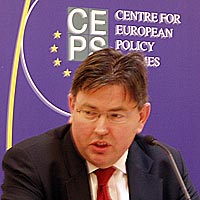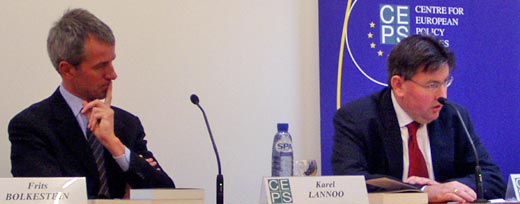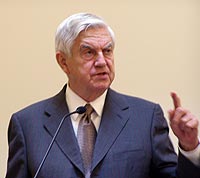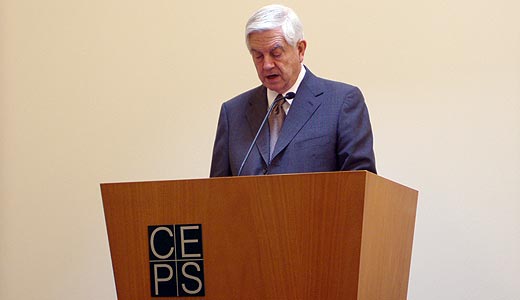Behind the scenes of the European Commission

Derk-Jan Eppink
INTRIGUE, TRICKERY AND DECEIT
Eppink tells how he discovered that the essential thing for a European official is to learn the procedures. "Because once you know how the procedures work, you can start to manipulate the process. I arrived in 1984 as a Calvinist, I'm leaving in 2007 as a Jesuit", Eppink said, referring to the differences between the principle-driven approach of the protestant Dutch and the devious conspiracies which are sometimes attributed to the catholic order of the Jesuits.
"I have learned all the necessary survival techniques to be a mandarin: intrigue, trickery and deceit. Many politicians in the Netherlands adhere to the view that intrigue is a very bad thing. But in fact, it works very well. Let me give you one example. My commissioner Frits Bolkestein had very strong views on immigration. He never went along with the line of the Commission to turn the European Union into an "immigration union". But at a meeting in 2001, it seemed that Bolkestein had agreed to a decision without knowing what he had agreed to. Only after the meeting, he found out what the decision meant, because it was on the front page of the Financial Times: "European Union = immigration union". Of course, he wanted to get rid of this decision. He asked: what can I do now? It is now the official line of the commission to open up Europe to full immigration from Northern Africa and the Middle East.
I said: the only thing we can do is to start an intrigue! We will have to ask Ministers of Justice in the member countries to try to undermine the proposal of the Commission. And that is exactly what we did. Without informing the Commission - because when you start an intrigue, you should not leave any traces - we made appointments with Ministers of Justice in the member countries. At that time, Belgium was the president of the European Council. So Bolkestein and I made an appointment with the Belgian minister of Justice, Marc Verwilghen, a very nice man. We met and we had a good lunch with lots of champaign. We agreed that the European proposal was totally unrealistic. I asked Verwilghen to try to get it off the agenda of the Commission and to bury it somewhere in his office, never to be seen again. And that is exactly what happened. A few weeks later, 9/11 happened, and public opinion and politicians got a completely different view on immigration.
This attempt of an intrigue, I have to admit, worked very well. That is how the European Commission works: there are procedures, but luckily there are also ways around the procedures."

Karel Lannoo, Derk-Jan Eppink
SIMILARITIES BETWEEN THE USSR AND THE EU
Karel Lannoo from the Centre for European Policy Studies asked Eppink if he saw some similarities between the EU and the late USSR. Eppink made a comparison between the two in the field of rhetoric, in mechanisms and in the way power is used.
- The Soviet Union wanted to harmonize as much as possible within a single political framework. This is also the mission of the European Union.
- The Soviet Union was administered by a political elite. So is the European Union.
- The Soviet Union saw itself as a utopian state. The European federalists have much the same views.
- The Soviet Union had a single bureaucratic center, like the one in the European Union.
- The Soviet Union was dominated by a powerful secretary general. So are the European institutions.
- The Soviet Union had party ideologists. The European Union has legal counselors.
- The Soviet Union wanted to create a viable society through a series of official procedures. So does the European Union.
- The Soviet Union had apparatchiks, the European Union has mandarins.
- The Soviet Union had a five year plan. The European Union has a work program.
- The Soviet Union saw socialist integration as an irreversible process. The European Union sees integration as a means for an "ever closer Union".
- The Soviet Union claimed to act on behalf of a mythical worker. The European Union has its mythical citizen.
- The Soviet Union wanted to surpass the United States. The European Union has been trying to do the same thing for many years.
"All in all, the Soviet Union lacked the self-correcting forces and the self-criticism which are proper to the democratic process. The European Union lacks these properties in the same way. By setting targets which are either too far away or unrealistic, you are undermining the legitimacy of the project and of the institutions which have to implement these policies. With this book, I want to warn for imperial overstretch and for the creation of expectations which are far-fetched and unrealistic. Sometimes I have the impression that the European Union is moving towards the same trap that finished the Soviet Union."
EUROPE'S THREE BIG ILLUSIONS

Frits Bolkestein
- If we are nice to the world, then the world will be nice to us. If we leave radical leaders alone, then nothing will happen to us.
- Mentally, we are preparing for our retirement. Nothing new, please! Will prosperity be sustained? We'll worry about that later.
- The best protection against globalisation is isolation.
CULTURAL CAPITULATION
Bolkestein warned for cultural capitulation, or what he calls "lack of cultural self-confidence":
"This became clear in the issue of the Danish cartoons. Most member states left Denmark in the lurch. One year later, virtually none of the European leaders defended the Pope when he made a perfectly defensible speech on the relationship between reason and faith. Europe is censuring itself with the Council preparing a special lexicon in order to counter what it calls "the use of offensive language". The word 'Muslim' is to be avoided because it is allegedly "inflammatory". European leaders wallow in apologetic behaviour. During his visit to India, Mr Gordon Brown, chancellor of the exchequer was asked to say something about insults made by an English girl against a film actress from Mumbai. The chancellor of the exchequer had to apologize for a reality show! I agree with Derk Jan Eppink's view that this cultural capitulation currently forms the most serious threat to Europe."

The book by Derk-Jan Eppink, "Life of a European Mandarin - Inside the Commission" is available in English (at Azur.be - Amazon.com link will follow in a few days) and in Dutch.



Reacties
Brian H
woensdag, 11 april, 2007 - 03:53TANSTAAFL
naaam
vrijdag, 6 april, 2007 - 20:54Is not "polder model" applied in an european wide?
Nicolas Raemdonck
zondag, 1 april, 2007 - 00:08There is a very large difference between civil society and the state, if I may say als a VLD-voter. (however, next election I only will vote for persons)
Civil society is the collective for groups, churches, unions, clubs, and so on. The state is something outside of it, that controls and regulates our lives. Civil society is part of us!
Michel Vuijlsteke
vrijdag, 30 maart, 2007 - 23:41Ah, semantics. And what was your point eactly, pray tell?
Cogito
vrijdag, 30 maart, 2007 - 16:44The 3 guys hereabove do not know the difference between the state and civil society.
Really!
I just talked to another VLD-voter. After a while and some talking of me he asked me - genuinely, without trying to provoke me, just an honest question - "what's the difference between the state and the civil society?"
Just a VLD-voter...
ddvvrr
dinsdag, 27 maart, 2007 - 00:54Jawn. Ironically, there is an analysis but no solution. Da svidanja.
Ludwig
zondag, 25 maart, 2007 - 22:16I do agree with Vuijlsteke on the tenous link with the USSR; a mere enumeration of extremely general concepts is made. For instance, it is clear that every political entity is governed by elites; and every entity somehow pursues an ideal, a utopia.
Why is no mention made of the principle of subsidiarity (which is taken into account much more than many are ready to admit)? How about the use of harmonisation as a last resort (anyone heard of mutual recognition?). I could go on and on.
Michel Vuijlsteke
zondag, 25 maart, 2007 - 12:26One man's "intrigue, trickery and deceit" is another man's informal discussions and lobbying.
USSR-EU: whoa! time warp! welcome to 1981!
In the EU, it's the member states that hold all power and make all the important decisions in the end. I would argue that this is a bad thing and that we need more European Union, you would probably say there's too much devolution already. In any case: the comparison to the USSR is tenuous at best.